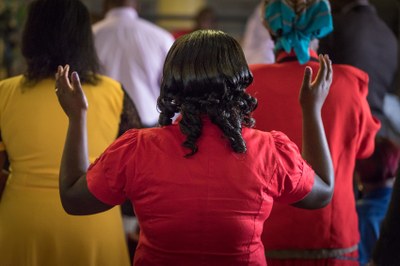Church Leaders in Eastern Africa Call for Urgent Action on Devastating Locust Invasion

Photo: Albin Hillert/WCC
NEWS PROVIDED BY
World Council of Churches
Feb. 20, 2020
GENEVE, Feb. 20, 2020 /Christian Newswire/ -- The following was written by Fredrick Nzwili*:
Church leaders in eastern Africa are calling for increased action against desert locusts which have terrorised the region since January this year.
Like scenes from the Book of Exodus, huge swarms of the insects have descended on the region, destroying farmlands and animal pastures. The outbreak is affecting seven East African countries, where such a scale of infestation was last seen seven decades ago. At stake is food security for millions of people.
"They are threatening livelihoods. They are clearing vegetation. The people's food security is in danger. We are calling on the government and those concerned agencies to increase their effort to curb the problem," said Kenya's Anglican Archbishop Jackson Ole Sapit. "We can see from the way it's developing, it's going to be difficult...to fight it alone. I urge the international community within Africa and outside to join hands so that we can repulse the locusts."
The locusts were first seen in Kenya in December after they made landfall in Wajir County, northeast of Somalia. Another swarm also entered the country from Ethiopia. The hoppers have since spread in 17 Kenyan counties. Last week, a locust invasion near a church in Embu central forced a suspension of a service, as a congregation walked out to chase away the insects.
"They are spraying them, but the eggs the insects laid continue to hatch," said Jacob Nzoka, a Caritas official in the Catholic diocese of Kitui, a locust hit area.
On 17 February, the locusts spread to South Sudan – the world's youngest nation - where millions are facing hunger, partly due to climate change and prolonged conflict. The Food and Agricultural Organization said an estimated 2,000 adult locusts entered the country through Uganda.
"Even before we can resolve our political issues of peace and the formation of the Revitalised Transitional Government of National Unity, South Sudan is now experiencing the invasion of locusts," said Fr James Oyet Latansio, a Roman Catholic priest who is general secretary of the South Sudan Council of Churches. "People are now crying and calling for God's intervention."
An estimated six million South Sudanese people face severe food insecurity and are in need of humanitarian aid, according to humanitarian agencies.
Save the Children warned that without coordinated preparedness and control measures for locusts, as well as an increase in funding surveillance and community mobilisation, the locusts could contribute to a further drop in nutrition levels.
According to scientists, although the insects are called desert locusts, they thrive after heavy rainfall which results in more vegetation in deserts and arid areas. Since last year, eastern Africa has experienced heavy rainfall linked to a condition called Indian Ocean Dipol, a warming of the sea surface resulting in increased rainfall.
* Fredrick Nzwili is a freelance journalist based in Nairobi, Kenya.
Member churches in South Sudan
SOURCE World Council of Churches
CONTACT: Media Office +41 79 507 6363, media@wcc-coe.org
Related Links
www.oikoumene.org/press

